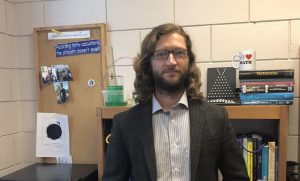
Photo Credit: Winona Daily News
Winona State University professor Jacob Duncan is at the frontline for discovering a new way to predict relapses in addiction.
Duncan, an assistant professor of math and statistics, says he first fell in love with math back in the 1990s. He remembers being shown a fractal zooming video made by Cornell University. Fast forward to his teens, Duncan told the Winona Daily News that he “started slowly realizing that math is probably the most precise and most succinct way of describing any natural phenomena.”
Duncan started studying insects when completing his PhD. Specifically, he had been modeling insect break-outs. Through his research he noticed similarities between the insect breakouts and addiction relapses. His new studies combine his passion for math and his insect research.
“I realized that there are … some fundamental similarities, at least, phenomenal logically, between insect outbreaks and addiction relapses. So relapses to an addict as an outbreak is to the forest,” he said to Rachel Mergen of the Winona Daily News.
He further explains the connection between relapses and insect breakouts in the newspaper’s article, “An individual fanatical relapse, it throws your brain neurotransmitters all out of whack. That’s sort of like the devastation you see in a forest. And it takes a while for your brain to recover and get those neurotransmitters back to (normal) levels. Normal state, that’s sort of the recovery period. But then once that’s happened, the stage is set again for another relapse, just like after the forest regrows, the stage is set for another outbreak.”
This new model uses cravings and moods to help predict potential relapses. Mood changes are much faster than cravings, they spike and crash faster compared to slowly coming and going.
Duncan’s model aims to predict the fast and slow states’ durations, then use that information to anticipate a potential relapse. Health care professionals can then use this information to prepare for a relapse when helping a patient. This research will now go onto clinical trials to see if this is an efficient way to help patients.
To learn more about Duncan’s research visit Winona Daily News.
